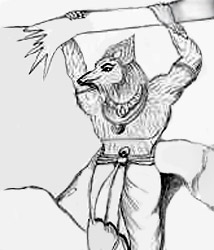 Jambavat is the king of bears. Jambavat killed the lion that slew Prasena, the possessor of the Syamantaka gem. Jambavat killed the lion, when the jewel was in his mouth.
Jambavat is the king of bears. Jambavat killed the lion that slew Prasena, the possessor of the Syamantaka gem. Jambavat killed the lion, when the jewel was in his mouth.
Originally, the god sun gave the gem Syamantaka to Satrajit, who gave it to his brother Prasena fearing that Krishna would take it away from him. One of the functions of the gem was to protect its bearer when the person is good or to ruin him if he is bad. Prasena being wicked was killed by a lion, which was again killed by Jambavat.
When Prasena disappeared, everybody suspected Krishna of killing him for that jewel. So, Krishna started tracing the steps of Prasena and found that he was killed by a lion. Later, he discovered that the lion was also killed by a bear called Jambavat. Then, Krishna found out the bear Jambavat in his cave. Krishna and Jambavat had a great fight within the cave whereas the people of Krishna waited for him outside the cave. After seven or eight days, when Krishna did not come out of the cave, his followers returned home and performed his funeral ceremonies. After twenty first day of battle, Jambavat submitted and gave the gem to Krishna. Then, Jambavat offered his daughter Jambavati to Krishna as an offering to a suitable guest. Krishna lessened the pain of Jambavat, which he suffered during the great fight.
Later, Jambavat became one of the generals in Rama`s army during the fight with Ravana. Jambavat was severely wounded by the magical weapons of Indrajit but was still conscious. He informed Hanuman about the four medicinal herbs that grew at Kailasa on the Himalaya mountains, which could restore his wounds. Hanuman at once flew to the spot, and brought the mountain peak and all its contents back with him to the camp, and Jambavat, with the other chiefs were soon made well.
This article is a stub. You can enrich by adding more information to it. Send your Write Up to content@indianetzone.com



















